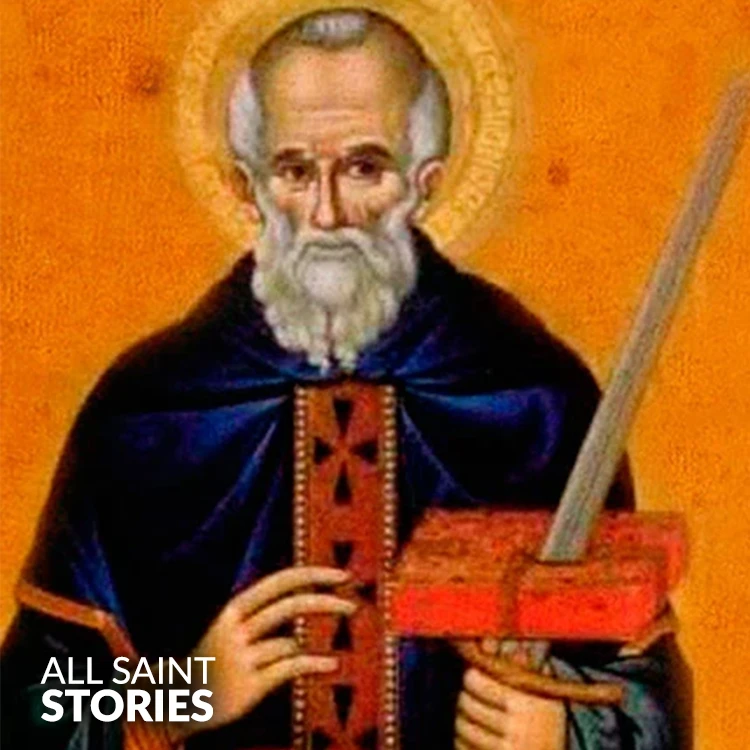Saint Boniface, faithful servant of God, who spread the light of Christ in lands far and wide, guide us in our journey of faith. Intercede for us that we may live with courage, strength, and a love for the Gospel, as you did in your life. Help us to remain steadfast in faith, and to serve others with a generous heart. Amen.
ST. BONIFACE
ST. BONIFACE

St. Boniface, the "Apostle to the Germans," was an English missionary who courageously spread Christianity throughout what is now Germany in the 8th century. A tireless evangelist, he is remembered for his leadership in converting pagan peoples, founding churches, and establishing monasteries. He is considered one of the greatest Christian missionaries of all time and was martyred for his faith.
St. Boniface, originally named Winfrid, was born in 675 AD in the region of Wessex, England. His early life was spent in a monastery where he received an education and spiritual formation. From a young age, Winfrid felt a strong calling to spread the Gospel, and it was during his time as a young monk that he received his religious name, Boniface, meaning "the doer of good."
Around the year 718 AD, Boniface left England to undertake a missionary journey to the pagan lands of Germany. At that time, many parts of Germany were still deeply rooted in paganism, and Christian influence had not yet taken hold. With immense courage and determination, Boniface traveled to the Germanic tribes in Hesse, where he began his work of evangelization. His efforts included preaching, baptizing, and organizing the Christian community.
Boniface’s most significant work involved the conversion of the Saxons, a group of pagan tribes in northern Germany. One of the most famous stories about him is the felling of the Oak of Thor in Geismar (now part of Hesse, Germany). The Oak was considered sacred by the local people, and it was dedicated to Thor, the Norse god of thunder. According to tradition, Boniface boldly chopped down the tree, demonstrating the power of the Christian God over pagan idols. After the tree fell, Boniface used its timber to build a church dedicated to St. Peter, marking a major victory for the Christian faith in the region.
Boniface’s missionary efforts also led him to establish several churches and monasteries across the lands he evangelized. One of his greatest accomplishments was the founding of the monastery at Fulda, which became an important center of Christian learning and spirituality. Boniface became the first archbishop of Mainz, and his efforts played a crucial role in consolidating Christianity in the region.
As a bishop and missionary, Boniface worked diligently to reform the Church in Germany, promoting clerical discipline and missionary work. He helped to organize dioceses and ordained new priests, setting the foundation for a more structured Christian presence in the area. Boniface was also instrumental in ensuring that the Christian faith took root in Germanic culture, influencing the development of the Church in the region for centuries to come.
In 754 AD, Boniface returned to his missionary work in Frisia, modern-day Netherlands, where he had a final, tragic encounter with a group of pagan Frisian bandits. Boniface, along with several of his companions, was martyred while reading from the Scriptures and preparing to baptize new converts. He was struck down in the midst of his mission, but his death only served to strengthen the Christian mission in the region. His body was later returned to Fulda, where it is buried.
St. Boniface’s legacy lives on in the many churches, monasteries, and dioceses he established, and his work in converting the Germanic tribes laid the foundation for the Christianization of much of central and northern Europe. He is considered the "Apostle to the Germans", and his influence on the Church in Germany is immeasurable. His martyrdom and commitment to spreading the Christian faith made him a revered saint in both the Catholic Church and Eastern Orthodox Church.
Video Not Found
The information on this website is compiled from various trusted sources. While we aim for accuracy, some details may be incomplete or contain discrepancies.
If you notice any errors or have additional information about this saint, please use the form on the left to share your suggestions. Your input helps us improve and maintain reliable content for everyone.
All submissions are reviewed carefully, and your personal details will remain confidential. Thank you for contributing to the accuracy and value of this resource.
Credits & Acknowledgments
- Anudina Visudhar (Malayalam) – Life of Saints for Everyday
by Msgr. Thomas Moothedan, M.A., D.D. - Saint Companions for Each Day
by A. J. M. Mausolfe & J. K. Mausolfe - US Catholic (Faith in Real Life) – Informational articles
- Wikipedia – General reference content and images
- Anastpaul.com – Saint images and reflections
- Pravachaka Sabdam (Malayalam) – Saint-related content and insights
We sincerely thank these authors and platforms for their valuable contributions. If we have unintentionally missed any attribution, please notify us, and we will make the correction promptly.
If you have any suggestion about ST. BONIFACE
Your suggestion will help improve the information about this saint. Your details will not be disclosed anywhere.
© 2026 Copyright @ www.allsaintstories.com







 English
English
 Italian
Italian
 French
French
 Spanish
Spanish
 Malayalam
Malayalam
 Russian
Russian
 Korean
Korean
 Sinhala
Sinhala
 Japanese
Japanese
 Arabic
Arabic
 Portuguese
Portuguese
 Bantu
Bantu
 Greek
Greek
 German
German
 Dutch
Dutch
 Filipino
Filipino